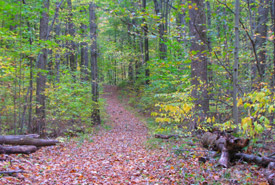Simply walking

Backus Woods, Ontario (Photo by NCC)
We nature nuts have a bad habit of using dense and trendy phrases like “sustainable development,” “ecosystem management” and even “biological diversity” to promote nature conservation. They can mean many different things and, at the same time, mean nothing to most people. When called upon, I like to turn to Henry David Thoreau's perfect expression of our dependence on nature: "...in wildness is the preservation of the world."
Wildness ― now that's a concept with staying power. But where did he make this statement, and what was he trying to tell us? Curious about the context, which slipped away long ago, I went on a bit of a literary quest. I could not find the line in my meagre Thoreau collection, so I tried my nearest university library. I tracked several experts quoting other experts before one gave me the source: an 1862 essay simply called “Walking.”
Thoreau lectured on walking in the 1850s, and later sent a manuscript of his talk to the Atlantic Monthly, which published it a month after he died. Admirers consider “Walking” to be one of Thoreau's best brief statements of his philosophy.
Thoreau found strength in walking and salvation in the wild. "A town is saved," he said, "not more by the righteous men in it than by the woods and swamps that surround it." The untamed wildness that stretched westward from 19th century New England held primitive forests and dismal swamps that were sacred to him. But his reverence is not that portrayed by romantic etchings of the day. Thoreau's wildness was the tangible "marrow of nature" that you can eat, drink, climb, breathe and sing. It was also a state of mind ― a place free from the shackles of society and conformity. In wildness, he believed, we can find not only serenity, but sanity.
The actual essay still eluded me. To see it first in print, I had to go to a small out-of-the-way nature reserve northwest of Calabogie, Ontario. I was leading a naturalists’ field trip to a granite bluff in Centennial Lake Provincial Park. There, I showed them a small rusty plaque pegged to the rock. The message? You guessed it: "In wildness is the preservation of the world." The person who left the plaque, I've been told, placed it there decades ago when he used to hike to this road-less area to fish.
I was talking to the group about my search for Thoreau's essay when one hiker got a quizzical look on her face. She picked up her backpack, pulled out a sandwich bag, and in a fine moment of serendipity produced a crisp hardcover copy of “Walking.” It was a gift from a friend, and she had brought it along thinking it would be just the companion for an exhilarating hiking trip to the Madawaska Highlands.
We cracked it open at the next rest stop. A page was read, then another and another. We relaxed and reclined, our bodies slowly sinking into the moss; the spoken words washed through our imaginations and mingled with the sounds of the rustling pine boughs. The spirit of Thoreau's message lingered as we drifted back down the hill that day.
That experience reminded me of why the word “wildness” means so much to me. The wildness that will preserve the natural world is not just big wilderness. It is wildness that we cherish all around us: the pocket-sized protected area, the ravine, the hedgerow. It is the wetlands we safeguard and the dead trees and other natural messiness we treasure in managed forests. We need to instill more wildness into what passes for the real world.
And there is wildness, too, inside all of us. It is that simple side of us that loves to walk. When we are self-propelled and gadget-free, we are in touch with a more benign, less polluting past.
I doubt that Thoreau would own a car if he were here today. But if he did, I bet it would sport a bumper sticker: "Live simply, so that others can simply live." Now where did that line come from...?
A version of Simply Walking originally appeared in Seasons, published by the Federation of Ontario Naturalists.


